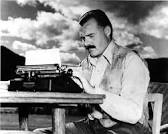One Last Word on Hemingway

At the Morgan Library & Museum in New York City now there is the first major museum exhibition devoted to Hemingway and his work. Most of Hemingway’s papers are at the Kennedy Presidential Library in Boston. After Hemingway’s death in 1961, JFK, a reader of Hemingway, helped Mary Welsh get into Cuba and retrieve many of his belongings. She later donated Hemingway’s archive to the new presidential library partly in gratitude to JFK. This exhibition is entitled, “Ernest Hemingway: Between Two Wars.”
I remember clearly hearing the news that Hemingway had killed himself. I was still in graduate school, still in the Air National Guard, and I had come home from being a weekend warrior and my girlfriend at the time stopped by to see me and in the late afternoon and mentioned off highhandedly that Hemingway had killed himself, as if it was of little importance.
Once before I had heard about Hemingway’s death, this was when I was still in high school, and while listening to the radio (as we did back then) while doing my homework I had heard that Hemingway was dead, killed in a plane crash in East Africa near Murchison Falls. But it wasn’t true. The plane had crashed landed. He had survived, as had Miss Mary, with minor injuries; Mary had two broken ribs; Hemingway a head wound. The next day they boarded a second plane that exposed at take-off. This time Hemingway suffered burns and another concussion, this one serous enough to cause leaking of cerebral fluid. Eventually they reached Entebbe to find reporters covering the story of Hemingway’s death. On December 19, 1954, I would read the full account of what happened to Hemingway and his famous quote: “My luck, she is running good,” summing up the two African plane crashes.
This time it was true. He had shot himself with his favorite rifle. Having read about his death, and how his wife, Miss Mary, had picked him up only days before at the Mayo Clinic in Rochester, where he was being treated for hypertension and suffering from depression and drove him home to Ketchum, Idaho, I wrote a poem about his passing.
Sunday Morning
July 2, 1961
The road home was flat.
Miss Mary drove.
The old hunter, watching
The distant hills,
Small breasts against the plains,
Thought of Kenya, the rugged
Mountains, where death was
Close as brush,
Gentler than the
Slow defacing of flesh.
Fragile as the light birds he
Picked from the sky
Decades and miles away,
He no longer heard the call.
He wrote of sin as no small town
Methodist ever had,
Carving his prose with a new
King of tool;
Honed in the woods of Michigan,
Sharpened by a fascist war,
And tempered for an old man of Cuba.
Pencils now were hollow in his hands,
The juice that flowed so ready
Had yellowed in his veins.
He was what Gertrude had proclaimed.
Sunday he woke to our tragedy,
Sought in the library of his exile
His own Kilimanjaro.
Feeling in sick hands the shape he loved
His mind slide back to Africa.
The gun grew hot.
Seeing the maimed lion charge
He threw the bolt,
Shaking the Idaho home,
Waking Miss Mary
To know.
No comments yet.
Add your comment